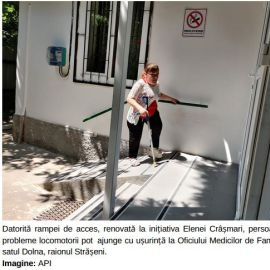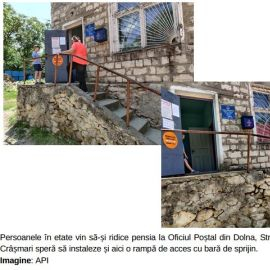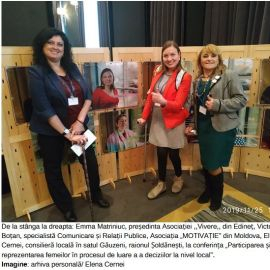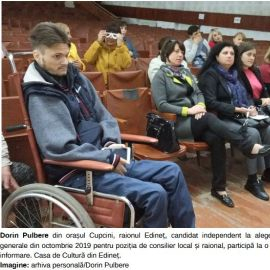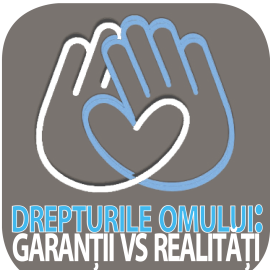back
People with disabilities fight for their rights in local councils

Human rights experts encourage people with disabilities to be more active and involved in political life.
In the Republic of Moldova, people with disabilities are still under-represented in political life. For example, in the 2019 general local elections, 20 people with disabilities stood as candidates, but only nine became local councillors. Human rights experts encourage people with disabilities to be more active and involved in political life, and voters to be tolerant and look at people not in terms of their disability but in terms of their professionalism. Without an adapted ramp, the councillor was walking on her feet One of the local councillors elected in autumn 2019 is Elena Crâșmari. She set out to defend the rights of people with disabilities in Dolna, Strășeni district, coming to the local council as an independent candidate. She understood that participation in elections and political involvement is the best way to promote the rights of people with disabilities. Being in her first mandate, Elena has already taken concrete steps to improve community life, in particular she has succeeded in completing a project to renovate the Family Doctors Office (OFM) in the village. "We were having problems with the ceiling and it was raining both the doctors and the children. Now we have good conditions, a modern sanitary block with an access ramp and a handrail for people with disabilities." The access ramp was built back in 2017, but because the angle was too steep and the staircase was damaged, it was impractical: "I used to come to the medical point and had to ask the doctor to come out on the stairs to give me his hand to climb up. Sometimes I was even ashamed to ask for help and had to take off my shoes and walk on my hands and knees to get up the stairs. Finally, after several attempts, we managed to renovate it." But Elena didn't stop there, she recently got the vote of the local councillors to allocate 70,000 lei from the reserve budget for the construction of an access ramp with handrails to the Town Hall and the Leisure Centre, and for the repair of the stairs and the terrace in front of the Town Hall. "I defend the rights of people with disabilities, but at the same time all citizens benefit. It hasn't been easy, yes, I've been discriminated against, but what doesn't kill me makes me stronger," she says. In the future, she hopes to get support for a ramp with a grab rail to be installed at the Post Office too. She will continue to fight and write to the authorities to improve the lives of the villagers of Dolna: "Yes, it's very hard, but disability is not an obstacle." Because they don't know their rights, people with disabilities are often marginalised 44-year-old Elena Cernei is a local councillor in the village of Găuzeni, district of Soldanesti, and is already in her second term of office. Elena has suffered from scoliosis since childhood and says that she mainly helps people with disabilities because they are often marginalised and discriminated against because they don't know their rights. She helps bedridden people, those with severe disabilities, especially with access to information: "I accompany them everywhere they need to go and help them prepare their set of papers, for example, to get their disability degree. I also go with the elderly and help them with their paperwork, I even drive them myself in my car. I tell them: if you need help at 12 o'clock at night, you can always contact me, I'm ready to help you". Three years ago, Elena initiated a project to build a playground in the locality, with slides and sports equipment, including for people with disabilities. "The site is already ready, we have talked to local people who are abroad and they are ready to invest. If it wasn't for this pandemic, the playground I think was already open, but unfortunately we stopped. I hope that this project will be voted by the councillors and that we will be able to get the necessary money to start the works", said the councillor. Cupcini town hall could stream all local council meetings online Dorin Pulbere from the town of Cupcini, Edinet district, is among the 20 people with disabilities who ran independently in the autumn 2019 general local elections for the position of local and district councillor. The young man obtained 106 votes for the position of local councillor in the town of Cupcini, a number of votes equal to one other candidate, who also won the mandate after the draw of lots, provided for by law in these cases. Even so, he has not given up fighting for his rights and those of other local people. The young man has prepared a petition and is collecting signatures from people asking the local government and the Cupcini town council to ensure access to information by broadcasting live council and committee meetings on the website www.cupcini.md. Dorin is convinced that this decision should be adopted, as there are several categories of people who do not have access to information: "People with disabilities (due to lack of access to public buildings), the diaspora, and people who are employed and cannot attend council meetings at a certain time. We want and have the right to be informed at first source, and local elected officials and civil servants will know that their work is being monitored, the town hall will manage public money more efficiently, and citizens will be able to get involved in the decision-making process." Society is not tolerant enough to accept diversity According to the monitoring report of the general local elections of 20 October 2019 from the perspective of inclusion of people with disabilities, carried out in a project of the East Europe Foundation in partnership with other human rights organisations, of the nine councillors elected in the last local elections, seven are women and two are men. Victor Koroli, executive director of the Alliance of Community Centres for Access to Information and Training in Moldova (INFONET), explains why so few people with disabilities are running in local elections. "The first reason is the lack of confidence of people with disabilities, because for years this category has been denied and neglected. We still have stereotypes in society that these people are marginal, they don't exist, and society is not tolerant enough to accept diversity, specificity and special needs. The second cause is the infrastructure - the buildings here are not accessible. Most of the time, there is a huge problem with polling stations. Another cause is that the family itself discourages these people, because over time certain sequels have formed in families as well. Another very important issue is the political parties, which declare one but in reality do nothing. They promised concrete steps to include people with disabilities in the parties, but in reality there are no such steps," says V. Koroli. The expert says candidates often hide their disability for fear that voters will judge them on their special needs. Even so, the number of elected candidates has seen a substantial increase, and this is due to training, with disabled women in particular being trained to be actively involved in electoral processes. According to the latest data from the National Bureau of Statistics, in 2018 there are more than 175 thousand people with disabilities in Moldova, or 6.6% of the population. By Government Decision No. 723 of 8 September 2017, the National Programme on Social Inclusion of Persons with Disabilities for 2017-2022 was adopted, which aims to ensure equal opportunities for participation of persons with disabilities in the electoral process, remove barriers that hinder access of persons with disabilities to political, public and cultural life, increase by at least 30% the participation rate of persons with disabilities in elections, etc. The development of this Programme is also a condition for the implementation of the UN Convention on the Rights of Persons with Disabilities, an international act ratified by the Republic of Moldova in 2010. Through this document, our country is committed to develop and promote policies in the field of social inclusion of persons with disabilities and to adjust national legislation to international standards. Mariana Jacot
